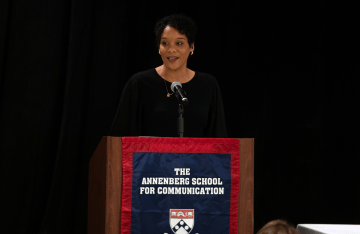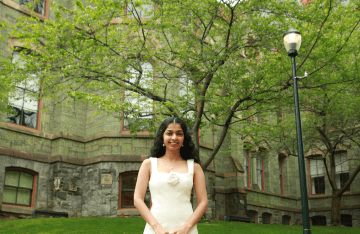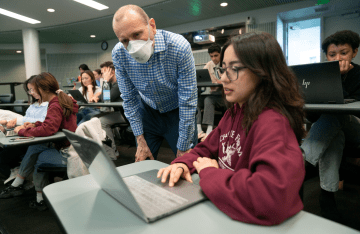Four New Lecturers — Including Two Alumni — Teach Annenberg Undergraduates This Fall
Murali Balaji, Samira Rajabi, Lee Shaker, and Aaron Shapiro will offer courses in their areas of expertise.

As a complement to its expert faculty members, the Annenberg School for Communication invites notable practitioners of Communication to offer undergraduate courses in their areas of expertise. This Fall, Annenberg is welcoming four new lecturers to its roster, including two of its alumni. They include Murali Balaji, Ph.D., a journalist and academic who also consults on issues of diversity and inclusion; Samira Rajabi, Ph.D., a postdoctoral fellow with Annenberg’s Center for Advanced Research in Global Communication (CARGC); Lee Shaker, Ph.D., a 2008 graduate from Annenberg and an associate professor at Portland State University; and Aaron Shapiro, Ph.D., a 2018 Annenberg graduate.
Murali Balaji has taught at Temple University and Lincoln University, where he chaired the mass communication department and engaged in multi-method research. His areas of research focus include political economy, critical race theory, and the connections between masculinity and nationalism. He worked as a journalist for nearly a decade, covering politics, sports, and demographic changes. He is the author of The Professor and the Pupil (2007), a political biography of WEB Du Bois and Paul Robeson, the editor of Digital Hinduism (2017) and co-editor of Desi Rap (2008), one of the seminal volumes on South Asian Americans and hip-hop.
He co-founded The Voice of Philadelphia, a non-profit geared to help high school dropouts (or pushouts) develop media literacy and citizen journalism skills.
Balaji is the founder of Maruthi Education Consulting and consults Annenberg on diversity and inclusion issues. He is a certified anti-bias trainer through the Anti-Defamation League (ADL) and serves on the national advisory board of the Religious Freedom Center of the Newseum Institute.
Samira Rajabi has been a postdoctoral fellow with the Center for Advanced Research in Global Communication for the last year. She is a scholar of development, international relations, feminist theory, and communication. Her research interests include international communication, trans-national boundaries, and the way culture, particularly popular culture in digital media, have consequences for social systems and movements. She recently authored a paper with CARGC Press. Rajabi published her work on the 2009 Iranian Green Movement in an edited volume from SUNY press titled Social Media in Iran.
Before coming to Annenberg, Rajabi worked as a Senior Fellow at the University of Colorado's Center for Media, Religion and Culture. Her work attempts to bridge public scholarship, academia, and social justice advocacy with leadership in her community. Rajabi also spends her time teaching, writing for various publications, and volunteering with Rotary International.
Lee Shaker is an associate professor of communication at Portland State University. His primary research interest is in the intersection of new communication technologies and politics. As people increasingly learn about their communities and countries via new, emerging information sources, long established political patterns and practices are changing.
Shaker's research has been published in many journals including Public Opinion Quarterly, Political Communication, and the Journal of Communication. In turn, this work has been featured in popular publications like the Yomiuri Shimbun, Boston Globe, Wired, Politico, and The Atlantic. Before joining the faculty at Portland State, he received his Ph.D. from the Annenberg School and was a postdoctoral researcher in the Department of Politics at Princeton University.
Aaron Shapiro received his doctorate from the Annenberg School in 2018. His research is located at the intersection of critical media studies, science and technology studies, and urban studies. He studies the cultural politics of smart cities, new media, and urban space. Some research interests include urban design and planning, labor, policing, collective action, mobs, publics, urban informatics, and visual and cartographic media. His book project, Design, Control, Predict: Logistical Governance in the Smart City, considers three case studies in the 'smart city' to explore the rise of logistical media technologies in urban governance.
Prior to beginning the doctoral program at Annenberg, Shapiro received an M.A. in Anthropology from the University of Pennsylvania and worked as a researcher and field supervisor on the National HIV Behavioral Surveillance project at the NO/AIDS Task Force in New Orleans.
Welcome to all of our new lecturers!



